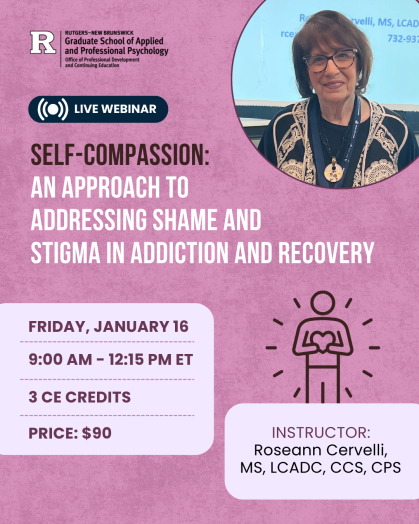Self-Compassion: An Approach to Addressing Shame and Stigma in Addiction and Recovery

Description
Emerging research in neuroscience and Compassion-Focused Therapy shows that practicing mindful self-compassion can profoundly impact physical, emotional, and spiritual well-being-especially for those navigating recovery. Based on the work of Dr. Kristin Neff, this workshop explores how self-kindness, mindfulness, and a sense of shared humanity can counteract harmful patterns like self-criticism, anxiety, and isolation—often at the root of substance use, disordered eating, and other at-risk behaviors. Shame, stigma and trauma are interwoven into the challenges faced by those who suffer from addiction and/or other mental health challenges.
Studies have shown that the implementation of Sell-Compassion is trans-theoretical - able to be utilized in whatever individual or group therapy utilized, including CBT, DBT, IFS, ACT, EFT etc. Participants will gain practical strategies and practices for themselves and for their client. Studies have shown that Self-Compassion has positive outcomes in assisting to regulate emotions, decrease anxiety, manage grief and trauma, enhance a sense of well-being, and build resilience and recovery capital for lasting healing and personal growth.
Learning Objectives
1). Participants will be able to name 5 ways in which the practices of Self-Compassion assist clients in meeting basic Core Needs, healing Core Wounds, including ACEs, Trauma etc., thereby serving as an antidote to the shame and stigma underlying addiction.
2). Defining and exploring the role of shame in addiction and trauma, participants will engage in a mindfulness practice of the 5 steps to transform shame and enhance emotional resilience through the practice of Self-Compassion.
3) Participants will be able to name the 5 Core Components of Compassionate Listening and participate in a dyad listening exercise to demonstrate this mindful form of listening.
4). Participants will be able to lead their clients in a minimum of three Mindful Self-Compassion practices and will be able to correlate how these practices fortify and enhance the recovery capital of those persons engaged in individual counseling, as well as clinical and/or self- help groups.
5). Participants will gain practical strategies for using self-compassion to regulate emotions, manage grief and trauma, and build resilience and recovery capital for lasting healing and personal growth.
Instructor Bio
Formerly an elementary school teacher of third and fourth grades, Roseann has been involved in the field of addictions for approximately thirty-six years. She holds an LCADC, CPS and CCS in addition to a Master's in Special Education. For ten years, Roseann served as the program director of an inpatient residential program for pregnant recovering women and adolescents. In addition, she has provided trainings and clinical groups in outpatient treatment settings, with a special focus on the needs of women, children and their families who have been affected by alcohol and other substance use disorders. For more than 20 years, she facilitated the Bright Futures Program for Children at Carrier Foundation and has always found her work with children and families to be inspiring and enlightening.
Currently and for the past 13 years, Roseann has worked as a Perinatal Addictions Specialist at Central Jersey Family Health Consortium, a non-profit maternal child health organization located in North Brunswick, New Jersey. As part of the Perinatal Addictions Prevention Program, Roseann provides educational presentations and trainings on many topics related to the prevention of substance use disorders and the fostering of behavioral, emotional, social and mental health and well-being to consumers across the life span.
For the past several years, Roseann has been studying and taking classes on Mindful Self-Compassion and Compassion for Others. This includes a nine-month, intensive program titled “Self-Compassion in Psychotherapy.” In addition to teaching seminar classes on this emerging and evolving topic at the former Rutgers School of Alcohol and Drug Studies and for Rutgers Graduate School of Applied and Professional Psychology, Roseann has done extensive work presenting this topic to staffs and students at schools and other provider service organizations.
It is Roseann’s hope that her offering of this presentation will serve all who work with those experiencing the challenges of substance use/abuse and other addictive and mental health challenges. It is her hope that the presentation will bring forth a deeper understanding of how and why the mindful integration of a culture of compassion in our present-day treatment modalities and programs will enhance a person’s motivation and commitment to initiate, maintain and sustain holistic, trauma-informed treatment outcomes.
Ms. Cervelli has no conflicts of interest for this program.
Contact Us
For questions, please contact: ce@gsapp.rutgers.edu
Continuing Education Information
Rutgers Graduate School of Applied and Professional Psychology (GSAPP) is recognized by the New York State Education Department's State Board for Psychology as an approved provider of continuing education for licensed psychologists #PSY-0123.
LMFT/MFT and LPC/LAC Licensed in New Jersey: Programs approved by the American Psychological Association are acceptable sources of continuing education credits. Please see https://www.njconsumeraffairs.gov/regulations/Chapter-34-Subchapters-10-31-Professional-Counselors.pdf, Section: 13:34-15.4 APPROVAL OF COURSES OR PROGRAMS on page 27. For all other professional licenses and certifications, please reference your issuing state board regulations regarding reciprocity of continuing education credits.

Rutgers Graduate School of Applied & Professional Psychology is approved by the American Psychological Association to sponsor continuing education for psychologists. Rutgers Graduate School of Applied & Professional Psychology maintains responsibility for this program and its content.
